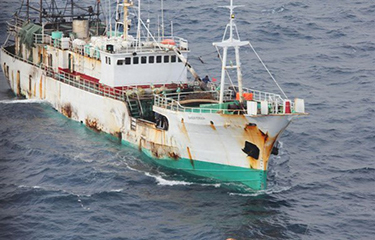NOAA releases report identifying seven countries engaged in IUU

NOAA has cited seven countries as engaged in IUU fishing, including Mexico, and an additional 29 countries or entities as lacking effective regulatory programs to combat bycatch, including the European Union.
The latest report, the “2021 Biennial Report to Congress on Improving International Fisheries Management,” determined that China, Costa Rica, Guyana, Mexico, the Russian Federation, Senegal, and Taiwan all had vessels engaged in IUU fishing activities during 2018-2020. Mexico’s presence on the list makes it the second report in a row where the country has been listed among those engaged in IUU fishing.
Alexa Cole, NOAA acting deputy assistant secretary for international fisheries and director of the NOAA Fisheries Office of International Affairs and Seafood Inspection, said during a 12 August press conference that Mexico’s inclusion on the IUU list is due to its failure to curb the flow of small vessels fishing illegally in U.S. waters.
“Mexico now faces denial of port entry into U.S. ports for its fishing vessels,” she said.
In addition to denial at U.S. ports, the country could face import restrictions on its fish and fish products. Import restrictions, Cole said, are under the purview of the executive office of U.S. President Joe Biden, and as of yet no action has been taken.
“They are available under the statute, but no determination has been made at this time,” she said.
Mexico was among three countries listed in NOAA’s 2019 IUU report, alongside Ecuador and South Korea. In contrast to Mexico, however, both Ecuador and South Korea managed to earn positive certification from NOAA, thanks to actions the countries took to remedy IUU fishing activities, Cole said.
“We are encouraged by the positive steps certain nations took to address the identified IUU fishing practices,” Cole in a press release. “NOAA is committed to working with each of the 31 nations and entities identified in this year’s report to strengthen their fisheries management and enforcement practices.”
Mexico’s continued negative status is a result of its failure to curb IUU, not for its lack of action, Cole said during the press conference.
“This has been a longstanding and somewhat intractable problem,” Cole said. “In recent years, we have seen progress on behalf of the Mexican government in trying to take responsibility on this issue. Unfortunately, what we’re not seeing is results yet.”
According to Cole, Mexican infractions into U.S. waters actually increased since its first negative certification, despite the actions of the government.
“I would give the Mexican government some credit that they have been trying to take some steps to resolve the issue,” she said.
Meanwhile, The 29 countries or entities listed under having insufficient bycatch rules were listed due to NOAA changing how it determined whether bycatch policies matched the stipulations in the U.S.
Among the 29 countries or entities listed are: Algeria, Barbados, China, Côte d'Ivoire, Croatia, Cyprus, Egypt, the European Union, France, Greece, Grenada, Guyana, Italy, Japan, Republic of Korea, Malta, Mauritania, Mexico, Morocco, Namibia, Portugal, Saint Vincent and the Grenadines, Senegal, South Africa, Spain, Taiwan, Trinidad and Tobago, Tunisia, and Turkey.
“It was a couple of different factors that led to the slightly different approach that we took in this year’s report,” Cole said of the latest IUU report.
One factor was that NOAA historically struggled to find reliable data on bycatch, and thus changed the way it analyzed bycatch by examining fisheries using fishing practices that are known to cause bycatch of certain species. Another factor was NOAA’s efforts to make progress on improving the management of Atlantic tuna species.
NOAA, Cole said, tries to engage in bilateral fishing management measures with various regional fisheries management organizations (RFMOs), such as the Western Pacific Regional Fishery Management Council.
According to Cole, while many RFMOs had seen improvement management, efforts with the International Commission for the Conservation of Atlantic Tunas (ICCAT) had been unsuccessful.
“In that case, multilateral efforts were not being successful in that arena, so that made us think whether we had tools under the belt,” Cole said.
The new bycatch listings are an effort to use a different method to engage in multilateral and bilateral processes with the countries and entities listed to make progress on Atlantic tuna.
In addition to the report, NOAA has been utilizing the Seafood Import Monitoring Program (SIMP) to try and keep seafood caught via IUU out of U.S. markets. According to Cole, NOAA remains committed to the program, and is making efforts to improve on it is it currently exists.
“One of the things that we are focused on recently in terms of implementation of SIMP is trying to ensure that we are fully implementing the program as it exists at the moment,” she said.
Included in that is a push to expand NOAA’s IT infrastructure for predictive risk analytics to deter IUU fish products, and expand and strengthen the team working on SIMP.
“This process and SIMP are not overlapping but they are complimentary programs that the U.S. has to address IUU fishing,” Cole said.
Photo courtesy of NOAA






Share